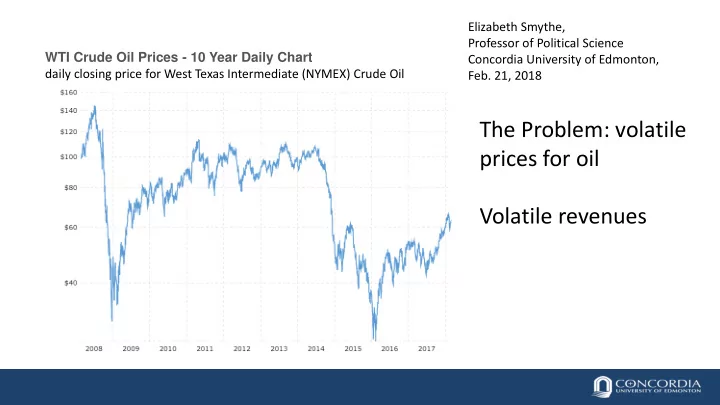

Elizabeth Smythe, Professor of Political Science WTI Crude Oil Prices - 10 Year Daily Chart Concordia University of Edmonton, daily closing price for West Texas Intermediate (NYMEX) Crude Oil Feb. 21, 2018 The Problem: volatile prices for oil Volatile revenues
Alberta resource revenue plunges to historic low (CBC, Mar 4, 2016) Federal Budget 2017
The Problem: Democracy • Petro states, • The Captive State • The curse of oil All of these terms describe the same process of erosion of autonomous institutions. In the case of an economy and revenue streams based on fossil fuel extraction “the distinction between the government and the corporation gets blurred” (Taft, Oils Deep State , 2017 ) “ Royalties can become a politically addictive way to cut taxes and susbsidize services” (Taft, 124). Election night Notley reassured the energy industry she was open to a partnership and would work collaboratively with them. What else could she do?
Premier Notley with oil sands company executives announcing the re- start of production after the Fort McMurray fire.
What would an ideal Alberta look like? • A diversified economy • Higher royalty rates in the past and an AHSTF that looks like Norway • Revenues based on fair progressive taxation of income That is not the Alberta we have today. Given what we are faced with today I am going to argue that the least worst option is a sales tax. I would argue that a sales tax would not only fund important services and programs, address the deficit and be a steady and predictable source of revenue it would restore democracy and assist Alberta to move to a real and credible climate change policy .
Why is it proving so hard to solve this problem and reach a consensus on the need for a new and stable source of tax revenue? In essence tax has become a four letter word (Himmelfarb, 2015) “The notion that taxes are somehow separate from the services and goods they buy is now a part of our political culture.” So is a level of distrust of government that has eroded social solidarity. Yet people still value many of the services governments provide especially provincial government services like health and education. The discussion of taxation is really a bigger conversation about the role of government. Those wanting to shrink that role have used the discourse of keeping taxes low and cutting taxes to achieve that end ( Harper government GST cuts). The anti-tax movement has also been disingenuous in claiming that efficiency, cutting waste can make up the lost revenue with no change to services “Tax cuts based on the promise of ending the gravy train almost never find enough gravy” ( Himmelfarb)
Looking at the Carbon Tax as an example : On February 23, 2017 A Mainstreet Research Poll reported “ 64% of Albertans say the oppose the provincial carbon tax – that’s down slightly from a similar question asked in December of 2015, support for the Carbon Tax is at 34%, up 5 percentage points .” However if you link a tax to funding services that people value you get a different result. The Parkland Institute commissioned a poll by McCallister Opinion Research which asked Albertans about the carbon tax around the same time and found a majority 59% opposed it. However, linking it to various policies and programs that people valued showed a different view.
Table 3: Decided voters’ opinions, "To what extent would you favour or oppose the Alberta carbon tax if you knew the funds were used to ..." (Ian Hussey, April 11, 2017, Albertans Like Carbon Tax when it is tied to enhancing public services)
The 2015 federal election provides another lesson on deficits ”Trudeau, too, needed time to get over the Canadian political class’s obsession with balanced budgets. He waited until the campaign was well underway before announcing he would run small deficits to help fund a $60-billion infrastructure program. The announcement was the turning point of the campaign, helping the Liberals vault from third place in the polls to first” Source: Carmichael, Canadian Business Oct. 20, 2015
Globe and Mail editorial March 24, 2017 As Albertans debate whether they are better off with the NDP or a right-wing hybrid party, they might want to ask themselves a question: How much longer can they afford to elect governments that fail to develop the kinds of stable revenue mechanisms – a sales tax or higher income taxes, notably – that can help smooth out the rough patches and keep the province moving forward in hard times? One day, in the predicted "post-carbon age," demand may be so low that the price will permanently collapse. What Alberta needs is a politician with the courage to tell people that they can either pay their own way now, or leave those costs to subsequent generations that will not be blessed with money that can be dug out of the ground. Whether that politician is on the left or right will be a moot point.
Recommend
More recommend